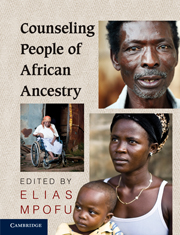Book contents
- Frontmatter
- Contents
- Contributors
- About the Editor
- Editorial Board
- Foreword
- Preface
- Acknowledgments
- PART 1 FOUNDATIONS OF COUNSELING IN AFRICAN SETTINGS
- 1 Indigenous Healing Practices in Sub-Saharan Africa
- 2 The Role of the Oral Tradition in Counseling People of African Ancestry
- 3 Assessment for Counseling Intervention
- 4 Research on Counseling in African Settings
- 5 Deconstructing Counseling Psychology for the African Context
- 6 Racial Oppression, Colonization, and Identity: Toward an Empowerment Model for People of African Heritage
- PART 2 CONTEXTS OF COUNSELING
- PART 3 COUNSELING APPLICATIONS
- PART 4 THE FUTURE OF COUNSELING IN AFRICAN HERITAGE SETTINGS
- Counseling People of African Ancestry Multiple Choice Answers
- Index
2 - The Role of the Oral Tradition in Counseling People of African Ancestry
Published online by Cambridge University Press: 05 August 2011
- Frontmatter
- Contents
- Contributors
- About the Editor
- Editorial Board
- Foreword
- Preface
- Acknowledgments
- PART 1 FOUNDATIONS OF COUNSELING IN AFRICAN SETTINGS
- 1 Indigenous Healing Practices in Sub-Saharan Africa
- 2 The Role of the Oral Tradition in Counseling People of African Ancestry
- 3 Assessment for Counseling Intervention
- 4 Research on Counseling in African Settings
- 5 Deconstructing Counseling Psychology for the African Context
- 6 Racial Oppression, Colonization, and Identity: Toward an Empowerment Model for People of African Heritage
- PART 2 CONTEXTS OF COUNSELING
- PART 3 COUNSELING APPLICATIONS
- PART 4 THE FUTURE OF COUNSELING IN AFRICAN HERITAGE SETTINGS
- Counseling People of African Ancestry Multiple Choice Answers
- Index
Summary
OVERVIEW. In this chapter, we consider the role of the oral tradition in counseling people of African ancestry. We first analyze the meaning and significance of aspects of the oral tradition and some of its constituent genres, such as myth, legend, and fable, in an African context. Second, we contemplate the potential place of the oral tradition in actual counseling with clients of African ancestry. More particularly, we reconsider the role that the oral tradition can play in the healing process of people of African ancestry, who may have lost the sense of connectedness to a past that provided support in a variety of cultural contexts and traditional structures. We conclude by investigating two folktales and their role in a counseling session.
LEARNING OBJECTIVES
By the end of the chapter, the reader should be able to:
Discuss some of the different forms the oral tradition in an African context may assume.
Explain the role of the oral tradition in counseling clients of African ancestry.
Analyze the meaning and significance of the oral tradition and some of its constituent genres, such as myth, legend, and fable, in an African context.
Critique the unwarranted emphasis on a positivist approach to counseling in an African context.
Express an understanding of the importance to utilize the oral tradition in the counseling of people of African ancestry.
Discuss the interventive use of folklore (diagnosis, wellbeing, and development) in counseling.
- Type
- Chapter
- Information
- Counseling People of African Ancestry , pp. 22 - 40Publisher: Cambridge University PressPrint publication year: 2011
- 3
- Cited by



